So how many of you have heard of "soft bro" culture? I'm guessing only a few, and those of you who have heard of it are probably like me and live on tumblr way too much. "Soft bro" culture can best be described as a subculture of young men who like traditionally masculine activities (sports, barbecue, wearing baseball hats backwards, dogs) but who exhibit a level of emotional sensitivity and casual kindness that is not considered part of traditional masculinity. Think Chris Evans holding a puppy and talking about intersectional feminism. Soft bro.
Now, soft bro culture is really only a thing inasmuch as any subcultural movement is a thing, more a collection of images and tropes than a conscious push or effort, but it's worth talking about because I actually think soft bro might be one of the more healthy expressions of masculinity out there. It's like aggressive femininity: taking the traditional gender roles and embracing them not because you have to but because you like them and you can. Soft bro isn't just for guys just like aggressive femininity isn't only for girls. It's a way of reframing traditional masculinity in a way that's healthy and happy and I am totally all for it.
I'm bringing this up, though, because as much as soft bro is a growing subculture online and in real life, it seems to be having trouble translating into our larger pop culture. You don't see many sensitive jocks with hearts of gold who happen to care a lot about social justice in the mainstream, or if you do they're jokes we're laughing at. So I thought it was high time to highlight a series that does explore masculinity, but does so by looking at the plurality of what it means to be masculine.
So let's talk about Check, Please! and how this one little webcomic is saying some really interesting stuff about what it means to be a bro.
If you haven't read Check, Please! I suppose you can be forgiven for not knowing about it, but you should totally get on that. A webcomic written by Ngozi Ukazu, Check, Please! follows a collegiate hockey team during the four years of Eric "Bitty" Bittle's time on the team. We enter with Bitty as he comes for orientation and presumably we'll close with Bitty when he graduates. It's hard to say now because we're just starting Bitty's Junior year, but we can always hope the story will keep going.
Anyway, the comic is about Bitty, but it's also about the other hockey players and their lives and relationships. Most specifically, it's about the relationship between Bitty and the team captain, Jack Zimmerman, a "hockey robot" from a hockey family who is more than a little intense about the sport and definitely more than a little bit dreamy. On first blush, this looks like a traditional fish out of water story, with the vaguely feminine Southern Bitty facing off against the traditional masculinity of the hockey team and most notably Jack. But actually the story and themes are a lot more complex than that.
Eric "Bitty" Bittle is a hockey player, yes, and a very good one. But he's also a former figure skater, near-professional pie baker, and so Southern it hurts. He likes dressing all dapper, loves the music of Beyonce, and openly admits that he chose to go to this college in particular because it's a LGBT+ friendly campus. And while Bitty is a fantastically talented hockey player, he's not without his flaws. He's terrified of being checked, skittish around larger players (which is just about everyone), and unused to the grueling physical dedication Jack demands from his team.
While his actual dad is awesome and not at all a bad man, the intensity of these expectations messed with Jack's head a lot. He abused prescription medication in order to self-treat an anxiety disorder and nearly died of an accidental overdose just days before he was supposed to be drafted into the NHL. So now Jack is playing college hockey and trying to get his life back on track, but also slowly learning how to handle his illness in a healthy way and maybe how to be happy.
Just in looking at our two leads, we can see a conversation happening about masculinity. Both Bitty and Jack have complicated relationships with their fathers. Jack because his father is a hockey star who he desperately wants to make proud, and Bitty because his father is a football coach in Georgia who has never understood his tiny pie-baking son. As the two of them become friends and eventually move into a relationship, we see how their respective expressions of masculinity can work together to form a better whole.
What I mean is that Jack's problems with himself don't come from his love of a traditionally masculine activity like hockey, they come from the societal pressure to outdo his father. Bitty's problems aren't that he likes traditionally feminine things, they're that he's been hurt in the past quite literally by traditionally masculine things.
Do you see what I mean? This webcomic seems very intentionally to be examining what it means to express gender and how we can reframe the conversation to be about finding the good and pushing away the bad.
Seriously, even the minor or side characters in Check, Please! are part of this conversation.
Shitty Knight (first name unknown) is Jack's best friend and a perfect encapsulation of soft bro culture. A foul-mouthed hockey weirdo who loves keggers and streaking, Shitty is also a women's studies major obsessed with intersectional feminism who eventually goes off to Harvard Law. Or take his kind of maybe girlfriend Lardo (real name Larissa Duan), the team manager who is also majoring in art but can beat all the guys in beer pong and embraces bro culture.
There's Ransom and Holster too, two musclebound jocks who get each other "best friend ice cream sundaes", share a bunkbed, and root for each other so much that they spend months arguing over who should be team captain...because they both think the other is much more qualified.
Nursey and Dex openly struggle with their expectations of each other and problems with toxic masculinity. Chowder is a precious angel of sweetness and light, but he's also a really competent hockey player who got his team to the finals in his freshman year. Do you see what I mean? Nearly every character in this comic, even the ones who just pop in for a few strips here and there, contribute to a conversation on what healthy masculinity is and should be.
I guess it's the fact that all of this happens in a webcomic about hockey, a very traditionally masculine (and white) sport, that makes me so happy. We're used to seeing explorations of masculinity that throw aside traditional expressions and embrace everything new and different and we're also used to seeing stories where traditional masculinity is completely upheld and nothing should be added or subtracted from it. It's relatively rare, however, to see a story that praises elements of traditional masculinity while criticizing others.
Check, Please! openly admits that there are elements of hockey culture that aren't healthy. That's a huge part of Jack's story, particularly now that he's graduated and gone pro and has to hide in the professional closet.
 The comic examines how the subculture of violence in hockey is a real problem, particularly for people who have had traumatic experiences like Bitty.* It even gives us a look at how going through life without examining the potentially damaging aspects of pro hockey can hurt someone, as seen through Kent Parsons, Jack's friend from before he OD'd.
The comic examines how the subculture of violence in hockey is a real problem, particularly for people who have had traumatic experiences like Bitty.* It even gives us a look at how going through life without examining the potentially damaging aspects of pro hockey can hurt someone, as seen through Kent Parsons, Jack's friend from before he OD'd.But the comic doesn't leave us there. It doesn't throw up its hands and say that sports and sports culture and bad and need to be scrapped in order to make way for a new healthier masculinity. Instead it talks about all the ways that sports can be a conduit for really good masculine expressions.
It emphasizes the feeling of being on a team of people who love and respect you. It shows the team becoming a family who all chip in to make each other happy. We get scenes where everyone sits and eats Bitty's pies together, where they all get dressed up to go to Lardo's art show, where everyone pitches in to buy Bitty a brand new oven. We aren't left with the message that there's no good in traditional masculinity, we're left with an understanding of just how much good there is and how we can harness it.
It's easy when we talk about gender to get all caught up in the bad stuff. To spend all of our time decrying harmful and toxic stereotypes. I know that I personally really don't take enough time to look at the good, and that's a shame.
Check, Please! is about the good. It's about taking what is right and loving and kind and tossing out everything that's not. Eric Bittle loves pies and figure skating, but he's still masculine. Shitty loves bell hooks and kegstands, and he's still masculine too. Jack likes History Channel documentaries and Eric Bittle, and he's definitely masculine. None of it detracts from the rest of it, that's what we're getting at here.
Talking about the good often feels less rewarding than calling out the bad, but in the long run I think it's a better way to go. We don't have to throw all of masculine culture away, just like we shouldn't devalue all of feminine culture just because it's been commodified and made compulsory. Instead, we should emphasize that you can pick and choose what you like from either. Traditional masculine activities and interests are fine, as long as it's clear you don't have to like them. Lipstick is great, as long as you don't have to wear it.
I like soft bro culture. I'm a fan. I like it because it takes something that could be harmful and works to make it good. And I like Check, Please! for the same reason: it takes an area where a lot of people have been hurt, college athletics, and reframes it as a healthy, fun, and loving place to be. Reading this comic is like getting a warm hug around your soul, and what could be more healthy than that?
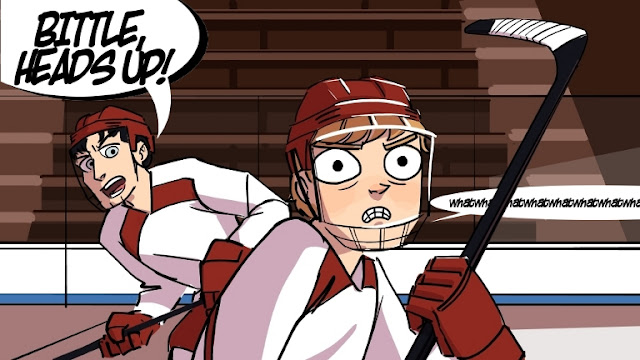 |
| Also Bitty's terrified face is adorable. |

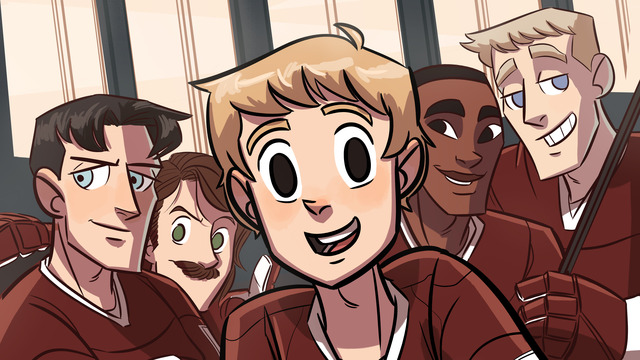
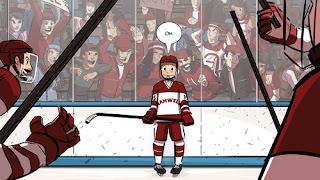
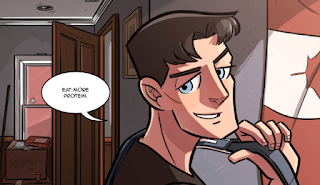
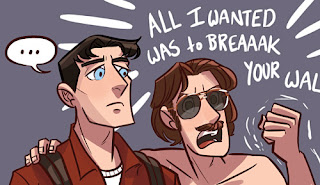
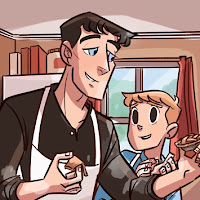
Hi, long time reader, first time caller.
ReplyDeleteJust wanted to say thank you and that I really appreciate all of your reviews. In the case of "Check, Please!", first off, I would never have read it, which would be a shame because it is good. (Like, as in, I read this webcomic as far as it currently goes in maybe two hours). Secondly, because of your post, the dialogue of masculinity and how the comic deals with it was running in the back of my head while I was reading the comic. (Also, I probably wouldn't have noticed how big of a deal Bitty's problem with checking is, which would be a shame, because it's literally called "Check, Please!" and I therefore would have missed all the beautiful symbolic/metaphorical inner workings of the comic).
Again, thank you overall for your reviews as well as this specific one.
~Anna C.~
Call girls in Gurgaon
ReplyDeleteCall girls in Lucknow
Call girls in Guwahati
Call girl in Gurgaon
Call girl in Lucknow
Call girl in Guwahati
Bangalore call girls
Gurgaon call girls
Lucknow call girls
Guwahati call girls
Bangalore call girls
Gurgaon call girl
Lucknow call girl
Guwahati call girl
Bangalore call girl
Escorts in Gurgaon
Escorts in Lucknow
Escorts in Guwahati
Escorts in Bangalore
Escort services in Gurgaon
Escort services in Lucknow
Escort services in Guwahati
Escort services in Bangalore
call girls in bangalore
Escort service in Gurgaon
Escort service in Lucknow
Escort service in Guwahati
Escort service in Bangalore
Gurgaon escort
Lucknow escort
Guwahati escort
Bangalore escort
Faridabad call girls
ReplyDeleteFaridabad call girl
Faridabad escorts
Faridabad escort
Escort services in Faridabad
Escort services in Faridabad
Call girls in Faridabad
Call girl in Faridabad
Faridabad escort services
Faridabad escort service
Escorts in Faridabad
Escorts in Faridabad
Escorts in Faridabad
Escorts in Faridabad
Escort in Faridabad
Escort in Faridabad
Escort in Faridabad
Escort in Faridabad
Escort services in Faridabad
Escort services in Faridabad
Escort services in Faridabad
Escort services in Faridabad
Escort service in Faridabad
Escort service in Faridabad
Escort service in Faridabad
Escort service in Faridabad
puri escorts
ReplyDeletecall girls in puri
puri call girls
puri call girl
escorts in puri
escort services in puri
escort service in puri
puri escort
housewife escorts in puri
russian escorts in puri
college escorts in puri
bhubaneswar escorts
call girls in bhubaneswar
bhubaneswar call girls
bhubaneswar call girl
escorts in bhubaneswar
escort services in bhubaneswar
escort service in bhubaneswar
bhubaneswar escort
housewife escorts in bhubaneswar
russian escorts in bhubaneswar
college escorts in bhubaneswar
cuttack escorts
call girls in cuttack
cuttack call girls
cuttack call girl
escorts in cuttack
escort services in cuttack
escort service in cuttack
cuttack escort
housewife escorts in cuttack
russian escorts in cuttack
college escorts in cuttack
========================================================================================================================================================================================
This is so much amazing .so,you can also visite my links.
ReplyDeletecall girls in kolkata
russian escorts in kolkata
kolkata call girls
call girls kolkata
escorts in kolkata
kolkata escort
housewife escorts in kolkata
college call girls in kolkata
call girls in park street
escorts in park street
call girls in gurgaon
call girl in gurgaon
gurgaon call girls
escorts in gurgaon
gurgaon escorts
gurgaon escort
Escort services in Gurgaon
Escort service in Gurgaon
russian escorts in gurgaon
housewife escorts in gurgaon
college call girls in gurgaon
Call girls in Noida
Call girl in Noida
Escorts in Noida
Escort services in Noida
Escort service in Noida
Noida Escorts
Noida Escort
Noida Call girls
Noida Call girl
I am very happy with your article ... very interesting for me to read. I will also always visit your website. Thank you for sharing this information with us.
ReplyDeleteAgen Togel
kolkata Escorts
ReplyDeletekolkata Escort
kolkata Independent Escorts
kolkata call girls
kolkata Escort Service
escort in kolkata
escorts in kolkata
independent escort in kolkata
kolkata Independent Escort
kolkata call girls
call girls in kolkata
call girls kolkata
vedic villege Escort
ReplyDeletevedic villege Escorts
vedic villege Escort service
vedic villege Escort girls
vedic villege call girls
vedic villege independent Escorts
vedic villege independent Escort
park street escorts
park street escort
park street escort service
park street independent escorts
park street escort girls
park street call guirls
park street model escorts
park street female escorts
ESCORTS SERVICES
ReplyDeleteINTERNATIONALSEX GUIDE KOLKATA
CALL GIRLS NEAR ME
CALL GIRLFRIEND RELATIONSHIP
ESCORT SERVICES
KOLKATA SEX
CALL GIRL IN KOLKATA
ESCORT SERVICE IN KOLKATA
GIRLS WHATAPP NUMBER
ONLINE GIRLS
FEMALE ESCORTS
FEMALE ESCORT
CALL GIRL NAME AND MOBILR NUMBER
CALL GIRL KOLKATA
ESCORTS SERVICE
MASSAGE IN KOLKATA
GIRLS PHONE NUMBER
INDIAN MASSAGE PARLOUR SEX
ESCORTS SERVICES
CALL GIRLS NO
CALL GIRLS KOLKATA
BEAUTIFUL SEXY GIRLS
ESCORT KOLKATA
ESCORTS KOLKATA
ESCORT IN KOLKATA
ESCORTS IN KOLKATA
COLLEGE GIRL HOT
ESCORT SERVICE KOLKATA
KOLKATA VIP ESCORTS
KOLKATA HIGH PROFILE ESCORTS
KOLKATA COLLEGE ESCORTS
KOLKATA INDEPENDENT MODEL ESCORTS
KOLKATA CALL GIRLS ESCORTS
KOLKATA CHEEP ESCORTS
Online health & safety essay writing services are very difficult to complete and many students are always searching for Health & Safety Writing Services to help them complete their health & safety research paper writing services and health & safety coursework writing services.
ReplyDeletePositive site, where did u come up with the information on this posting?I have read a few of the articles on your website now, and I really like your style. Thanks a million and please keep up the effective work. 메이저사이트
ReplyDelete